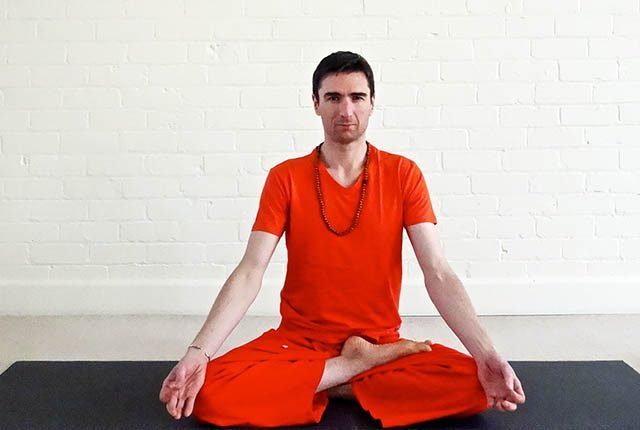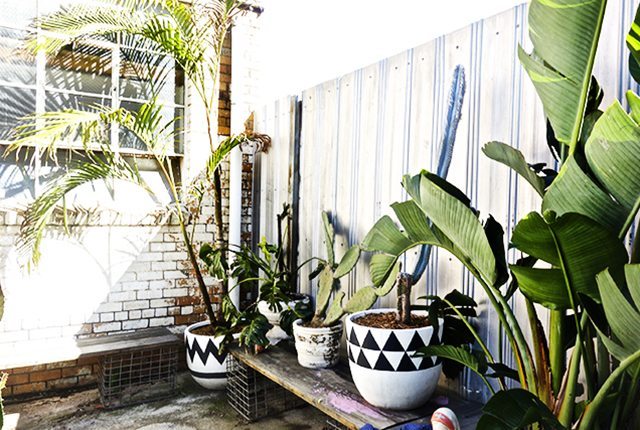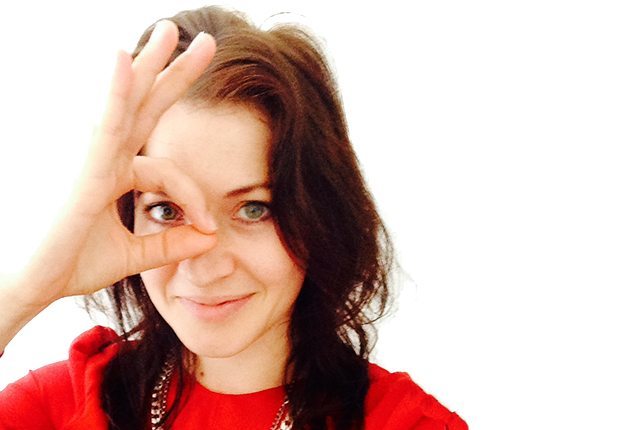
 In the pursuit of happiness, I feel it is important to consider that there is more than one path. Not everyone has the same definitions of success or are driven by power, fame and fortune. Some believe that a richer life is instead achieved my mastering yourself and detaching yourself from such needs. How does one do that? Meet Swami Gopal Puri, a yoga teacher based in Richmond’s Yoga in Daily Life, a yoga studio that works on toning the mind just as much as it does the body. Gopal was originally a physicist in Hungary until his hobby of yoga become his profession. Find out how he defines success and how you too can lead a life of riches far greater than any gold bullion or Gruosi Diamond could buy.
In the pursuit of happiness, I feel it is important to consider that there is more than one path. Not everyone has the same definitions of success or are driven by power, fame and fortune. Some believe that a richer life is instead achieved my mastering yourself and detaching yourself from such needs. How does one do that? Meet Swami Gopal Puri, a yoga teacher based in Richmond’s Yoga in Daily Life, a yoga studio that works on toning the mind just as much as it does the body. Gopal was originally a physicist in Hungary until his hobby of yoga become his profession. Find out how he defines success and how you too can lead a life of riches far greater than any gold bullion or Gruosi Diamond could buy.
Name: Swami Gopal Puri
Age: 42
Occupation: Yoga Teacher / Manager of Yoga in Daily life Melbourne.
Can you please explain the components of your name?
Swami is a title – it literally means master of self. You get it by being initiated by a spiritual teacher and I got initiated by a yogi, a swami in Indian. Gopal is my given spiritual name and my yogic family name is Puri.
What did you study and what was your original intended career path?
I studied physics in Hungary. I worked 3 years in physics but then I left to come here. As Hungary was an ex socialist country, there was no money for research so you ended up doing the same boring things and there was no future for a career in physics there – all my classmates just stayed at university for PhDs and at the end of that they had to change careers. Today hardly any of them are still in the field, unless they have gone overseas.
 [line][pullquote width=”300″ float=”left”]Yogi lifestyle is strangely but truly not really about others; it’s all about you.[/pullquote][line]
[line][pullquote width=”300″ float=”left”]Yogi lifestyle is strangely but truly not really about others; it’s all about you.[/pullquote][line]
Why did you leave Hungary?
I was doing yoga there with Yoga in Daily Life and I was given the opportunity to come to Australia as they needed help teaching yoga. This was 15 years ago when there was a lack of yoga teachers. I came to Australia with only a tourist Visa, but I knew I didn’t want to go back, so I found a way to stay. I went to Sydney for 4 years and during that time I studied programming for 2 years and was able to get my student Visa, then I applied for permanent residence and luckily I got it.
How does a physics and computing career relate to yoga?
I think it is quite similar. In Hungary, most of my yoga friends were mathematicians, physicists or chemists. Both are about natural science – analytical and how the universe works. Yoga, like science, is not religious.
 When did you decide to become a yoga teacher?
When did you decide to become a yoga teacher?
I didn’t! It just sort of happened. When I arrived they had just started a course in teacher training in the city centre. Everybody did that but I never thought of doing the teachers training as I believed I already knew enough about yoga after doing it for 5 years in Hungary. So when I did the training, nothing was new except for that it was all in English as I had obviously studied in Hungarian.
When were you introduced to yoga in Hungary?
22 years ago I saw, Swami Maheshwarananda, an Indian yogi in Hungary at a public lecture at a university where I decided to take classes and courses. I didn’t see him again until four years later. I was happy with courses and summer retreats but then I felt I needed something more so I went to an international summer camp where I saw him again and formally became his student.
 [line][pullquote width=”600″ float=”left”]How far can you go with a forward bend or a back bend? There is a limit. If you make your practice internal, with meditation, it’s limitless.[/pullquote][line]
[line][pullquote width=”600″ float=”left”]How far can you go with a forward bend or a back bend? There is a limit. If you make your practice internal, with meditation, it’s limitless.[/pullquote][line]
Tell us about your current job:
I co manage the Yoga In Everyday Life centre in Melbourne as well as teaching yoga at other external venues. Teaching yoga is only a small part of the business which requires a lot more things including planning, promotion, running programs such as retreats and workshops, managing the accounts as well as keeping the centre clean.
Do you miss having a desk job?
I prefer this, as it is more freedom. I can start working any time; morning, afternoon, late night; there are no fixed hours – only when I have to teach a class. Other than that, I can have the freedom to choose what I want to do.
Yoga used to be what I did in my leisure time, and then it became my livelihood, which is interesting because I felt like I lost my hobby. So in the first 6 months it was difficult and I thought I needed a new past time. I tried getting one, but it didn’t really work, so I thought I would go back to having yoga as a hobby and getting another job. After 6 months struggling, I thought, “it’s going to be ok”. Something switched inside my head and yeah it’s been ok since then.
 [line][pullquote width=”300″ float=”right”]Yoga says the aim of life is that you reach your fullest potential – whatever that means for you.[/pullquote][line]
[line][pullquote width=”300″ float=”right”]Yoga says the aim of life is that you reach your fullest potential – whatever that means for you.[/pullquote][line]
What are the biggest benefits of being a yoga teacher?
That you can make it your lifestyle. Yoga teaching is a job and supports your lifestyle and you can just live that way. This is great! Yogi lifestyle is strangely but truly not really about others; it’s all about you. Yoga says the aim of life is that you reach your fullest potential – whatever that means for you. So whether you are a teacher, doctor, a businessman, an artist, a chef, a housewife, a student etc it’s about getting more and more into that with the help of yoga supporting you on your journey to become better.
Do you like helping other people?
Teaching them something useful certainly feels good. However as, Sankara, a very famous yogi said “you may go to the pilgrimages, to the holy places, you may do charities, support the people, you may share what you have and yet unless you haven’t recognised who you are, your correct identity, you are going around in circles”. It sounds a bit selfish, but the aim of yoga is to find out who we are, and when you find that out, then you can help others.
How do you find out who you are?
Meditation. Yoga practice has to evolve to meditation – it starts on the mat, doing exercises, breathing and relaxation and then it evolves to sitting still.
 [line][pullquote width=”300″ float=”left”]This results ultimately in the same… finding yourself beyond the affects of external circumstances.[/pullquote][line]
[line][pullquote width=”300″ float=”left”]This results ultimately in the same… finding yourself beyond the affects of external circumstances.[/pullquote][line]
How do you feel about all the different modern types of yoga?
Traditional yoga isn’t as popular as the trendy yoga e.g. dynamic yoga and hot yoga, which are fast movements and lots of postures. They’re ok; you can look at yoga in that way, as it reflects how life is – busy. These classes are about keeping the mind at equilibrium. In a class there are lots of challenging poses linked into sequences imitating real life scenarios where you train your mind not to be swept up and carried away by them. A traditional class is much slower, you hold the postures a lot longer and it becomes a meditation by which you end up in a effortless state of being. This results ultimately in the same, as trendy yoga would, finding yourself beyond the affects of external circumstances.
What advise would you give to someone wanting to be a yoga teacher?
Explore your personal practice and understand the basics. Some yoga teachers do really quick courses, like 3 months, and they say they don’t know why they teach this way or that way or what the point /meaning is and what they are trying to achieve. You need to know that – just like in any other profession. A quick course isn’t going to satisfy that. You need to understand what style you believe in and what works for you.
 [line][pullquote width=”300″ float=”right”]I was on TV for 5 years, 2 or 3 times a week.[/pullquote][line]
[line][pullquote width=”300″ float=”right”]I was on TV for 5 years, 2 or 3 times a week.[/pullquote][line]
What are some of the unexpected outcomes of being a yoga teacher?
About 10 years ago when I came to Melbourne, the TV channel 31 wanted to run a yoga series. They were a not for profit TV station and were looking to partner with a not for profit studio. They found us through Google and I ended up doing it because no one else wanted to do it. I was on TV for 5 years, 2 or 3 times a week. People used to recognize me, come to the studio, and ring the bell, then when I opened the door they would say “its you!”. Everywhere I went people kept recognising me. Me! With the thick Hungarian accent! When Ch 31 took it off air, many people complained!
Do you get bored of doing yoga?
No. I am still learning. If you just practice postures, then you can get bored, as after a while, you know everything. How far can you go with a forward bend or a back bend? There is a limit. If you make your practice internal, with meditation, it’s limitless. Your mind is always different; it always presents something different, reacts in new ways to postures. Your physical stiffness and flexibility depends on your mind. For example, you might not be able to do something today that you did yesterday. At the end of the day in yoga we have to see beyond all the physical activities, mental oscillations and intellectual storms and find our inner self – who we are. That is an “Ere long” and interesting journey.

[line][pullquote width=”600″ float=”left”]At the end of the day in yoga we have to see beyond all the physical activities, mental oscillations and intellectual storms and find our inner self – who we are.[/pullquote][line]
Does being a yogi mean you never get angry?
It’s interesting because sometimes I can have a rough day and get angry about something, then when I go home and mediate, after 45 minutes I can feel my mind just drops the issue. It just disappears and it’s not important any more. Which is hard because sometimes it is important – but the next day you pick up where you left off.
So yeah I have my opinions and can get angry, but in mediation it just drops away. You have to weigh up both sides – do you meditate and drop each issue, or be a worrier and fight for what you think is right. I think, you have to do both, because that’s life and there are always issues. Likes and dislikes, joy and sorrow, friends and enemies belong to life. However mediation shows you something beyond all this and by that it keeps everything grounded and harmonised.
What about positive emotions like happiness?
You need to live in the world, and be dynamic. Heated externally, but internally keep cool and calm. This is the only spiritual goal – even mindedness. There is a book, The Bhagavad Gita, which defines a yogi / self realised person / saint. It says: “He whose mind is not shaken by adversity and who is in prosperity does not hanker after pleasures, who is free from attachment, fear and anger, is called a sage of steady wisdom”. You need to be involved with the world, being productive and helpful, but don’t get wind up and carried away by happiness, sorrow, pain, pleasure and all these things. It’s freedom not to let those things to have a grip on you. There is nothing wrong with happiness, don’t misunderstand me, but don’t chase it all the time. If you practice meditation, you find happiness in a different medium, which doesn’t depend on anything. It is you, it is always here, not an external thing. Once you are established in that, you cannot be easily shattered by the happenings of the external life.
 [line][pullquote width=”600″ float=”left”]There is nothing wrong with happiness… but don’t chase it all the time. If you practice meditation, you find happiness in a different medium, which doesn’t depend on anything… Once you are established in that, you cannot be easily shattered by the happenings of the external life.[/pullquote][line]
[line][pullquote width=”600″ float=”left”]There is nothing wrong with happiness… but don’t chase it all the time. If you practice meditation, you find happiness in a different medium, which doesn’t depend on anything… Once you are established in that, you cannot be easily shattered by the happenings of the external life.[/pullquote][line]
How do you define success?
My definition comes from a famous quote “A successful man is one who can lay a firm foundation with the bricks others have thrown at him”.
What would you say to your 21 year old self?
It doesn’t matter he wouldn’t listen. I wouldn’t make him change anything. I did a lot of things, travelled a lot, explored a lot… It all had to happen for a reason.
Dead or alive, who would you invite to a dinner party and why?
Steve Jobs – someone like him or maybe I would invite my 60-year-old self and see if he would say anything or I would listen to him at all :)
 [line]Visit the Yoga in Daily Life website to find out more about meditation and yoga classes.
[line]Visit the Yoga in Daily Life website to find out more about meditation and yoga classes.
[line]



